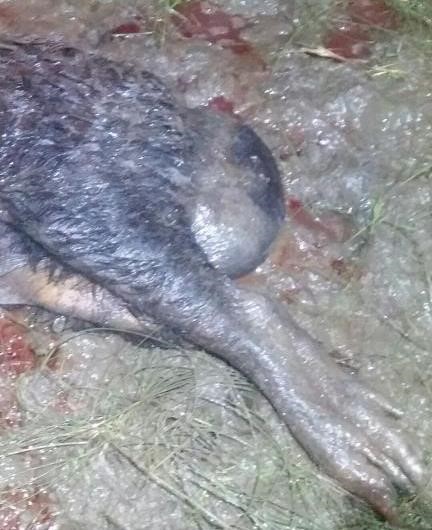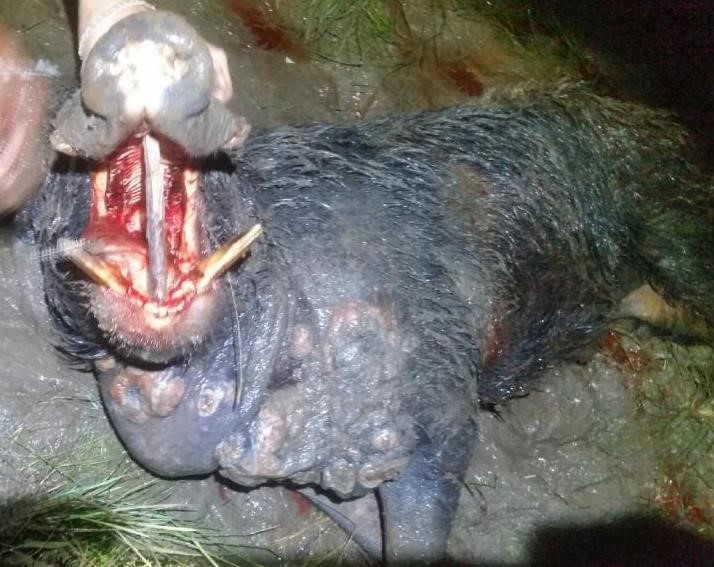Feral pig hunting is popular in the Northern Territory
You can hunt feral pigs on public land as long as you carry out best practice and adhere to the relevant laws of the Northern Territory (NT).
Being a responsible feral pig hunter
- Ensure that you obtain any necessary permits. There are heavy penalties for illegal pig hunting in the NT.
- Obtain permission from the owner if hunting on private property.
- Follow good biosecurity practice to minimise the spread of diseases, pests and weeds.
This will include:
- using personal protective equipment (PPE) (Refer to section on precautions)
- good personal hygiene (hand washing, changing soiled clothes)
- good hygiene for your dogs
- cleaning and disinfecting work areas and vehicles when leaving a hunt.
- ensure your dogs are well handled and trained not to chase livestock or wildlife.
Be aware of your ethical responsibilities by ensuring that humane methods are utilised to kill feral pigs and that they are not subjected to unnecessary pain or suffering.
Pig hunting with dogs
Dogs are permitted to be used when hunting feral pigs in the NT, however strict regulations are in place under the NT Animal Welfare Act (as in force April 2017) and the National Model Code of Practice for the Welfare of Animals: Feral Livestock Animals to ensure the humane treatment of feral pigs and the welfare of hunting dogs are enforced.
Heavy penalties apply for breaches of animal cruelty when undertaking an activity that involves hunting. Penalties may also apply if you don’t have the necessary permits to hunt on certain lands within the Northern Territory, including on Crown land or reserves managed by the Parks and Wildlife Commission of the NT or Parks Australia.
Additional information on feral pig hunting in the NT and how to obtain a pig hunting permit can be found on the Northern Territory Government website at: https://nt.gov.au/leisure/hunting-and-shooting
Managing the risk of disease
Feral pigs can host a number of diseases and parasites that may be transmitted to other animals and humans. Hunting feral pigs carries a high risk for contracting these potentially debilitating diseases, which have serious long-term health implications. Ensure that you take steps to protect the health of your dogs and yourself.
Butchering: You should wear appropriate PPE when butchering a feral pig. This includes gloves and footwear. Worms that you may see are not important for human health and are neutralised by proper cooking. However any abscesses found are likely to contain harmful bacteria and should result in the discard of the pig carcase. Many diseases do not show any signs in the pig carcase.
Some important shared diseases in pigs and people include:
Brucellosis- Bacterial disease causing severe long term illness, fever and influenza type symptoms. Symptoms in dogs can include fever, lameness, back pain, vomiting, lethargy and enlarged testicles. Brucellosis may be contracted by butchering and handling raw infected pig meat (especially reproductive organs), contaminated equipment and clothing, urine and contact with infected dogs.
Brucellosis is a notifiable animal disease in the Northern Territory. There is a legal obligation to notify your government veterinary officer if you know or suspect that an animal has this disease
Q Fever- A serious bacterial disease that causes severe influenza like symptoms which can be fatal. Infection is via contaminated animal tissue (especially intestinal tissue, faeces, urine and foetal fluids). Q fever is mainly spread by inhalation including during high pressure hosing, slaughtering animals and dressing carcasses.
Leptospirosis-A bacterial disease that can cause high temperatures, kidney disease, jaundice and meningitis (inflammation of the lining of the brain) which can be fatal. Leptospirosis is found in animal tissue, urine and commonly in swamp water. It enters the body through cuts and abrasions and contact with mucus membrane lining of the nose mouth and eyes.
Melioidosis – A bacterial disease. Commonly affected livestock include goats, pigs and camels. This disease has potential to be passed on to humans through contact with infected animals or soil.
Swine Influenza - Swine influenza is a highly contagious, rapid onset, respiratory disease of pigs. Pigs contract this disease through close contact with infected pigs. Swine influenza viruses are normally restricted to pigs, however occasionally a human may become infected. It is known that pigs have a potential to mix different strains of influenza viruses together to produce new strains that may have the potential to infect humans. In 2009 there was an outbreak in several pig herds in Australia that was quickly eradicated. Signs of pigs infected with Swine Influenza include:
- high fever
- discharge from eyes and nose
- sneezing
- breathing difficulties
- barking cough.
As well as diseases endemic to Australia, feral pigs have the potential to harbour and spread a number of exotic diseases not known to occur in Australia. This would have a major impact on international trade, the Australian livestock industry and our way of life.
These notifiable diseases include:
Foot-and-mouth disease – a highly contagious viral infection of domestic and wild cloven-hooved animals such as pigs, cattle, buffalo, goats and sheep. Symptoms found in animals include blisters and erosions in the mouth and on the feet, severe sickness and lameness.
Rabies –Rabies causes inflammation of the brain and spinal cord (encephalitis) resulting in death. The main symptoms include behavioural changes, varying neurological signs, progressive paralysis, coma and death in all species. This disease is also fatal in humans.
Swine vesicular disease – a highly contagious viral disease of pigs that is indistinguishable from foot-and-mouth disease. Symptoms include blisters and erosions in the mouth and feet, severe sickness and lameness.
Classical swine fever- a highly contagious viral disease of pigs, capable of spreading rapidly in susceptible pig populations. causing fever, purplish skin blotching and sudden death
Surra -a disease caused by the blood-borne parasite Trypanosoma evansi that is transmitted by biting flies. It can become established in a variety of animals including cattle, horses, pigs and dogs. Typical signs include chronic wasting, weakness, pale gums and swelling of the legs and brisket. This disease is often fatal. Surra would be virtually impossible to eradicate if it became established in Australia and is present in countries as close to Australia as Indonesia, Papua New Guinea and Timor.
 |  |
Enlarged testis in feral pig with Brucella suis Photo by Braiden Evans | Diseased feral pig Photo by Braiden Evans |
Precautions to prevent the spread of infections
- Do not feed raw feral pig meat to your dogs (especially reproductive organs, blood and offal).
- Use PPE. Cover all cuts and abrasions with waterproof dressings and wear rubber latex gloves and boots when processing feral pig carcasses to minimise exposure to potentially contaminated carcases.
- Always wash hands and equipment thoroughly after butchering and processing feral pig carcases.
- Wash dogs well after each hunt. Use PPE when washing and administering first aid to dogs
- Watch for signs of illness in your dogs and contact your local veterinarian if you have any concerns.
Important information
Feral pigs are a high risk for spreading diseases to humans, hunting dogs and other animals. All diseases shared with pigs are serious for people and must be diagnosed and treated by your doctor who must also notify the health authorities in case further action is required for your benefit.
Contact your local veterinarian if you notice any illness in your dogs.
Consult your doctor immediately if you develop symptoms after contact with potentially infected animals and inform them of your pig hunting practices.
If you suspect a pig disease of concern contact your Regional Veterinary Officer
Darwin: 8999 2035 Katherine: 8973 9716 Alice Springs: 8951 8181
Or call the Emergency Disease Watch Hotline on 1800 675 888 (24hr Hotline)
Give feedback about this page.
Share this page:
URL copied!